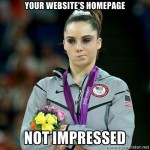
One of the biggest complaints business people have about their site, and a main source of my business, is that their website is not turning up in search rankings. Business people are continually trying to find ways to get their site on the first page of a search. What they fail to do, however, is to look for the reasons why the website is not performing well now. Website owners need to perform an analysis on why their site is not ranking high in search and not converting more visitors to leads and leads to customers. In others words, their site needs a check up. To help with this task, I’m going to lay out some of the steps to an SEO audit of a website. This should be done before you embark on any site changes.
There are two assessments you need to take when performing your SEO audit, technical assessment and content assessment. An SEO assessment will give you an idea of how your website works, how it attracts the attention of search engines, and how you’re focusing your efforts. Are you concentrating on impressing search engines or your visitors? Are you executing some SEO strategies poorly? For instance, are you using the right keywords or are you using them correcting or incorrectly, such as stuffing them into places where they don’t make sense.
There are over 20 areas of concern when you perform a technical assessment on your website. While there is not enough space to go through all of them here, let’s list some of the more important ones.
- Error messages – Is your site error message free or do visitors get error notices, such as 404 notices. Do they contain any temporary or permanent redirects, such as 301 or 302 notices.
- URL issues – Are they too long or contain characters that do not belong. Keyword stuffing your URL will hurt, not help when it comes to SEO. A good rule of thumb is to ask the question “Can I tell what this page is about by reading the URL”. If the answer is yes, you’re in good shape. URL’s should not contain dynamic characters (#,<,>,&,%,$, etc.). if you do use them, keep in mind that each character has a specific use and you must be sure you are using them correctly. The symbol # is ignored by search engines. So if there is a webpage such as www.politicians.co#Obama and www.politicians.co#Romney this can cause problems since search engines will only see www.politicians.co.
- Links – Links are the most important facet of SEO and are an article by themselves. For now, external links should be relevant to your sight and authoritative by nature. For more about links go to https://onlinemarketinginct.com/2012/11/05/seo-bad-links-are-worse-than-no-links/.
- Meta tags (Title, Description and Keywords) – Meta titles are the blue line you click on a search page to be redirected to a site. They should contain the keyword, be 50 to 70 characters in length and be unique to the page. Each page should have its own title. The Description is similar. Make them unique to the page, do not stuff keywords. They should contain contact information. A geo qualifier is important, i.e. Milford CT. Use more than 140 characters but less than 156. Meta keywords are ignored by most search engines so go ahead and ignore them as well. Be sure to limit them to 8 words and less than 100 characters if you decide to use them.
- Other places to look at in a technical SEO analysis include: h1, h2 tags, alt tags, images, anchor text, robots, file size, page depth level, internal links, site maps, bot crawling, and follow, no follow.
Ensuring the technical aspects of your site are correct and up to date is important, but site content must be examined too. The first question to ask is “Is the content on this page high quality?” Put yourself in your visitor’s shoes and ask “Did my questions get answered? Was it easy to find what I was looking for? Was the information valuable? Was the material well written?” Answering no to any of these questions should motivate you to make improvements.
From an SEO perspective, the keyword for each page should appear in the top headline (h1 tag). This alerts the search engines to what this page is about. Every page should have its own keyword. Put the keyword at the top of the first paragraph and then use it only when it makes sense to do so. If you have images, and you should, put the keyword in the alt tag as well as a word or two that describes the picture.
Once more visitors are seeing your site, are you maximized to get leads? For instance, how easy is it to navigate the site? Are your main value propositions appropriately displayed to get the most attention? Is your site free of distractions? For instance, you should never have a link that takes the visitor away from your site. If you do have outgoing links, make sure they open up in a new window. Are your Calls-To-Action clear and easy to follow?
Websites audits can be difficult. There are a lot of things to go over from both a content and technical perspective. But the results can significantly increase visitors, leads, and sales. It’s an effort well worth taking.